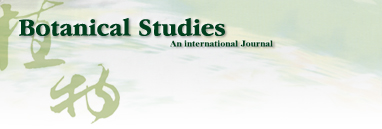 |
|
|
| TITLE | Proteinase and alpha-amylase inhibitors of sweet potato: Changes during growth phase, sprouting, and wound induced alterations |
| AUTHOR | K. Sasikiran Central Tuber Crops Research Institute, Thiruvananthapuram, 695017, Kerala, India M.R. Rekha Central Tuber Crops Research Institute, Thiruvananthapuram, 695017, Kerala, India G. Padmaja* Central Tuber Crops Research Institute, Thiruvananthapuram, 695017, Kerala, India |
| FULL TEXT | [in HTML format] [in PDF format] |
| ABSTRACT | Changes in proteinase (trypsin and chymotrypsin) and a-amylase inhibitors were monitored during the growth phase and sprouting of sweet potato, with a view to establishing the biological role of these secondary plant principles. Although the trypsin inhibitor (TI) activity of tuberising roots of sweet potato was very low in four genotypes at 15 days after planting (DAP), a steep increase was observed during the tuber-bulking phase, indicating a possible role for the inhibitor in regulating plant proteinases. In contrast, the chymotrypsin inhibitor (CI) activity decreased from 40-90 DAP, indicating an inconsequential role in protease regulation. With initiation of tuber bulking, the a-amylase inhibitor (AI) increased sharply in three sweet potato genotypes, and after completion of the bulking phase, the activity came down sharply at 105 DAP. A pronounced role for regulation of endogenous a-amylases by the AI of sweet potato could be postulated from the study. The TI activity increased in the tubers until the sixth day of planting in vermiculite, and it decreased with the emergence of sprouts, indicating the possibility of proteolytic cleavage at the time of sprouting. Amylase inhibitor activity continuously decreased until sprouting, indicating the role of these proteins as N-reserve proteins in sweet potato. A significant increase in proteinase inhibitor levels in all the sweet potato leaves was observed within four hours of artificial wounding. The rise in inhibitor levels was more evident in leaves far off from the wounded leaf. The fact that proteinase and amylase inhibitors of sweet potato are wound-inducible points to a major defensive role for them. This information on the proteinase inhibitor levels in sweet potato leaves and vines and their change with plant growth is of interest, especially due to their use as animal feed. |
| KEYWORD | a-Amylase inhibitor; Chymotrypsin inhibitor; Growth phase; Ipomoea batatas; Sprouting; Trypsin inhibitor; Wounding; |
| ARTICLE INFO | Botanical Bulletin of Academia Sinica, Volume 43 Number 4 October 2002, page 291-298, 8 pages |
| PUBLISHER | Institute of Plant and Microbial Biology, Academia Sinica, Taipei, Taiwan, Republic of China |
